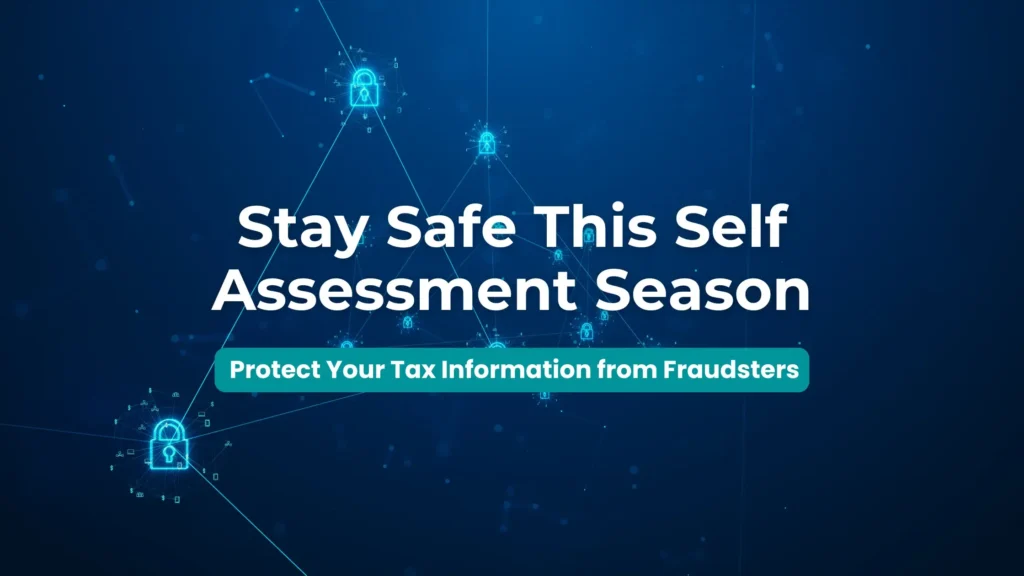Self Assessment season is coming , and while most taxpayers are busy preparing their returns, fraudsters are also on the lookout. Every year, thousands of people fall victim to scams designed to steal personal and financial information. These scams often appear as emails, texts, or phone calls that look like they come from HMRC.
It’s important to remember that HMRC will never ask for sensitive information such as your bank details, passwords, or PIN via email or text. Scammers rely on fear and urgency, but staying alert can protect you from falling victim.
This Self Assessment season, you need to be aware of self assessment scams and HMRC self assessment scams. Recognizing the warning signs and knowing how to report tax scam to HMRC is essential for keeping your tax information safe and secure.
Common Scams Targeting Self Assessment Customers
Tax season is a busy time, and unfortunately, it’s also when scammers are most active. As Self Assessment deadlines approach, fraudsters ramp up their efforts to trick taxpayers into revealing personal and financial information. Here’s a closer look at the most common scams and how to protect yourself.
Fake Tax Refund Claims
Have you ever received a message saying you’re owed a tax refund? It might look official, complete with the HMRC logo and familiar wording but don’t be fooled. These scams are designed to make you click on a link and share your personal or bank details.
Note: HMRC will never ask for your bank information or personal details by email or text. If you get a message like this, it’s almost certainly a scam.
Phishing Emails and Bogus Websites
Some scammers send emails that look like they’re from HMRC, claiming there’s a problem with your account. They’ll include links to fake websites that look almost identical to the real GOV.UK pages. Once you click, they can steal your login details or other personal information.
Note: HMRC will never ask you to log in or confirm details through a link in an email. Always go straight to the official HMRC website by typing it into your browser yourself.
Malicious Text Messages
Scammers also use text messages to trick people. These texts might say you’re owed money or even threaten legal action if you don’t respond right away. They often include links that lead to fake websites or connect you to scammers directly.
Note : HMRC doesn’t send random text messages asking for personal or financial details. If you receive one, don’t reply or click any links, just delete it.
Impersonation Calls
Fraudsters sometimes pretend to be from HMRC and call you directly. They often use scare tactics, saying you owe money or could face legal trouble if you don’t pay immediately. Their goal is to make you panic and act without thinking.
Note: HMRC will never threaten you or demand instant payment over the phone. If you’re unsure, hang up and contact HMRC directly using the official number on their website.
Don’t Delay Submit your Self Assessment Before The Deadline
Submit your tax return by 31 January to avoid late filing penalty. Swiftacc offers expert Self Assessment tax return services, starting at just £99.
Book an AppointmentWhatsApp UsWhy HMRC Scams Are a Major Problem
1. They target personal and financial information: Scammers try to trick you into giving bank details, passwords, or other sensitive information. Once they have it, they can steal money or even commit identity fraud.
2. They look official and believable: Emails, texts, calls, and letters often use HMRC logos, government style language, and professional formatting. This makes it easy to be fooled, even if you’re usually careful.
3. They create panic and pressure: Many scams use urgent language threats of fines, account closures, or legal action. This can make people act quickly without thinking, increasing the risk of falling victim.
4. They target everyone: No one is safe students, employees, self employed workers, or pensioners. Scammers often send bulk messages, hoping someone will respond.
Ways to Protect Your Tax Information
Keeping your tax information safe is essential. Scammers are always looking for ways to steal personal and financial details, but there are simple steps you can take to stay protected:
1. Use strong passwords and two factor authentication (2FA): Create unique, complex passwords for your HMRC and other online accounts. Turn on 2FA whenever possible; this adds an extra layer of security, so even if someone gets your password, they still can’t access your account.
2. Avoid clicking links in unsolicited messages: Emails or texts claiming to be from HMRC may contain links to fake websites. Never click on links from unexpected messages. Always go directly to the official HMRC website by typing the address into your browser.
3. Keep your devices secure and updated: Make sure your computer, phone, and tablet are protected with antivirus software, and regularly install updates for your operating system and apps. This helps prevent hackers from exploiting vulnerabilities.
4. Be cautious with personal information: Only provide personal or financial details through official HMRC channels. Never share passwords, PINs, or bank details in response to emails, texts, or phone calls.
How to Report an HMRC Scam
If you receive a suspicious email, text, or phone call claiming to be from HMRC, don’t click on any links or share your details. Forward scam emails to phishing@hmrc.gov.uk and texts to 60599. You can also report phone scams through the official GOV.UK website.
Stay Alert, Stay Secure This Self Assessment Season
Self Assessment season draws near, a little extra caution can make all the difference. Scammers are becoming more convincing, but by staying alert and following official HMRC guidance, you can keep your personal and financial information safe. Remember HMRC will never ask for sensitive details via email, text, or phone. If something feels suspicious, trust your instincts and report it right away.
Swiftacc knows the importance of staying safe during Self Assessment season. Our experienced team provides accounting support to save you time, reduce costs, and help your business grow. Contact us today for a free consultation and find the best solution for your business.

